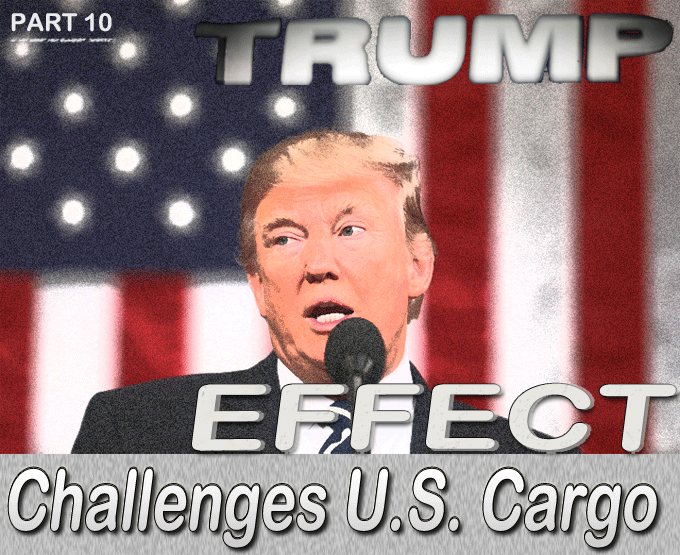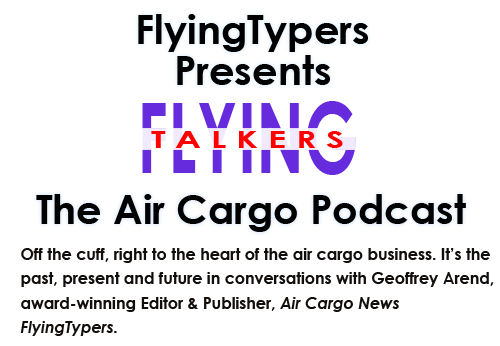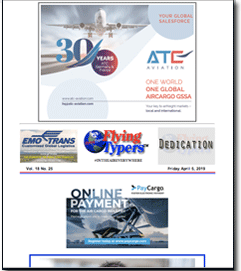
 Bill
Boesch is an air cargo pioneer but also a dreamer & doer across a
distinguished and exemplary 40 plus year career. Bill served as President
of American Airlines Cargo where he put that carrier on the world stage
during the Robert Crandall era. Bill
Boesch is an air cargo pioneer but also a dreamer & doer across a
distinguished and exemplary 40 plus year career. Bill served as President
of American Airlines Cargo where he put that carrier on the world stage
during the Robert Crandall era.
Bill is also a key logistician for U.S.
military forces who during the Iran & Iraq conflict created methodologies
in transportation that delivered the goods while saving lives.
For his effort Bill was awarded The Medal
of Freedom at a ceremony on Ellis Island in New York harbor, in the shadow
of the Statue of Liberty.
Among his other activities, Bill has contributed
a series of nine articles exclusively to FlyingTypers offering
his unique knowledge and perspective into the ongoing impact that the
administration of President Trump is delivering to business and air cargo.
In “Trump Effect Number 10”
Bill goes four square into sharing both an up to date business recap,
and look ahead into the latest thinking, as Amazon and other drivers change
the landscape for air cargo in 2019.
President Trump has been in office for
over two years now and – despite major political
opposition from Congressional Democrats and some Republicans –
he’s made good on many of his promises to enact sweeping change
in America.
The Record So Far
With the confirmation of Justices Neil Gorsuch
and Brett Kavanaugh to the U.S. Supreme Court, as well as a record number
of lower court judges, he has established a conservative majority in the
judiciary.
Mr. Trump has taken steps to shift U.S.
policy in a pro-life direction.
Promises Kept
Building on his campaign promises, Mr.
Trump has taken a hard line on immigration, rounding up and deporting
record number of illegal immigrants, tasking the U.S. military to secure
the southern border; arresting Central American illegal asylum seekers
and placing increased restrictions on H1-B visas.
Tax Cuts & Trade Deals
Mr. Trump's economic policy has included
a $1.5 trillion-dollar tax cut as well as a new, assertive trade policy
that rejected trade deals such as the Trans-Pacific Partnership, while
forcing the renegotiation of others, as with the new U.S.-Mexico-Canada
Agreement (USMCA) to replace the North America Free Trade Agreement (NAFTA).
In Veteran’s Affairs, he has pushed for
the partial privatization of the VA health system, promising increased
choice and higher quality of care for veterans and their families.
His support for Israel has been unprecedented,
including the recognition, both of Jerusalem’s status as the Israeli
capital and the annexation of the Golan Heights, seized from Syria in
1967.
The China Card
Mr. Trump challenged China with a tough
package of tariffs forcing them to the negotiating table to establish
a fairer trade deal and protection of American intellectual property.
He has reasserted American sovereignty
through his withdrawal from the Paris climate agreement, the Iran nuclear
deal, the United Nations Human Rights Council, and the UN's Global Compact
on Migration, as well as rejecting the G7's joint statement in 2018.
Fair Share Agenda
Mr. Trump has challenged U.S. allies, pushing
NATO allies such as Germany and France to pay their agreed share of defense
costs.
The Report Card
Whatever your opinion on these matters,
it’s undeniable that Mr. Trump has shaken up the status quo.
Economically at least, his policies have
paid off, with U.S. GDP booming, a stock market taking off and jobless
rates near record lows. But, while he has been busy, “Making America
Great Again,” this has come at a cost for the U.S. commercial airline
industry.
Cost To Air Cargo Not Favorable
Not all of the challenges of the U.S. commercial
aviation came out of his policies – record labor cost increases
led by pilot and mechanic shortages resulted from trends and policies
that predate the current administration.
But Mr. Trump's fair-trade agenda is a
factor hurting the U.S. air cargo industry.
The industry’s scheduled air cargo
service had dwindled to a single carrier – Amerijet, based in Florida,
serving the Caribbean and parts of South America with a fleet of 767 freighter
aircraft.
Beyond that, the U.S. flag integrators,
namely FedEx and UPS dominate U.S. freighter operations.
The remaining U.S. freighters are operated
by the American charter carriers whose predominant market is limited to
ACMI contracts for companies like DHL and Amazon, with CRAF missions to
fill out their product offerings.
Negative On China
The great hope for growth in the air cargo
sector, and somewhat in the passenger market, has been the Asia-Pacific
region, with booming China as the crown jewel. This market had been experiencing
tremendous growth in both revenue and yield, but American carriers now
risk having reduced volume and lower long term market share as trade disputes
bite into America’s trade with the region. Following the imposition
of tariffs on Chinese goods, carriers have reported a 30% drop in the
U.S.-Asia air cargo market.
Europe Is Oversaturated
A second tier of effect in this decline
has been the oversaturation of the U.S.-Europe market, where capacity
shifted from Asia has resulted in a glut that’s driven down yields.
These problems could be short-lived, but
not before potentially claiming some vulnerable victims in the U.S. cargo
industry.
This pressure makes the ongoing transformation
of the air cargo sector even more important.
Integrators No Longer Hold The Aces
The dominant position of the integrators
has already eliminated most scheduled U.S. air cargo freighter service,
with former cargo carriers either bankrupt or absorbed into other airlines.
Any serious observer of the industry will
already be looking ahead to the consequences of current trends and what
they mean for carriers.
Amazon Is The Elephant
The elephant in the room is Amazon, which
operates an unprecedented integrated business model.
Unlike FedEx and UPS who solicit their
express cargo from the manufacturers and e-commerce vendors, Amazon moves
its own merchandise, effectively making it, its own air cargo customer.
Currently Amazon meets its air logistics
needs with ACMI contracts for 767 aircraft from ATSG and Atlas, like the
long-gone Emery used to do.
Amazon also just announced that it is negotiating
with Atlas for a deal on 737F aircraft, which will give it increased penetration
of the U.S. market.
Amazon Alibaba Deal?
There are also strong rumors of an international
startup in the next 18 to 24 months.
Amazon must be looking at Alibaba in China
with its 15,860 products from 5,286 vendors, possibly giving it and Alibaba
access to each other’s home country as part of the final U.S.-China
trade deal.
Amazon Can Control The Market
By being both vendor and carrier, and through
unprecedented data mining into customer preferences and habits, Amazon
can control its market and flatten out seasonality peaks and valleys by
adjusting prices and offering free express delivery, forcing many FedEx
and UPS customers to demand lower rates from the integrators so they can
be competitive.
What’s Next?
As Amazon expands and starts to operate
internationally, the situation is likely to worsen.
The question is, what is Amazon's next
move?
Will it start to operate its own airline
to lower its costs and control its own air transportation?
If so, will it form its own 121 airline,
“Prime” as its AMCI aircraft are already printed in its colors
and name; or will it buy one or both of the air cargo charter operators
it is presently using or maybe even an integrator?
Or is it thinking more strategic as all
it really needs to do is buy a controlling interest in any of these companies.
Either move by Amazon would change the
face of America’s air cargo industry and cause withdrawal or consolidation
of the present U.S. cargo charter carriers, and maybe even one of the
integrators.
Bill Boesch
My thanks to Kuba Wrzesniewski for his help in research and editing
this article.
To Read Part 1 of This Series, Click Here
To Read Part 2 of This Series, Click Here
To Read Part 3 of This Series, Click Here
To Read Part 4 of This Series, Click Here
To Read Part 5 of This Series, Click Here
To Read Part 6 of This Series, Click Here
To Read Part 7 of This Series, Click Here
To Read Part 8 of This Series, Click Here
To Read Part 9 of This Series Click Here
To Read Trump Effect—India Walks Softly Carries Big Stick, Click
Here
To Read Trump Effect—Implications Of A Trump Trade War, Click Here
To Read Trump Effect—Trump Across The Pacific, Click Here
|




 Vol.
18 No. 25
Vol.
18 No. 25 Vol.
18 No. 26
Vol.
18 No. 26